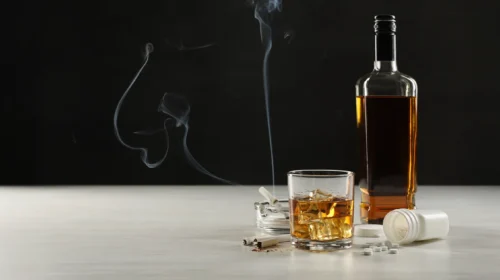Key Points:
- Aftercare is low-intensity care following detox, inpatient, or outpatient treatment.
- Relapse is incredibly common following addiction treatment.
- Finding a new therapist and learning new coping strategies is key.
- Choosing a good addiction aftercare program makes all the difference.
What Is Aftercare?
Following initial treatment, a patient must eventually transition back to life in the outside world. An aftercare plan for substance abuse could be the one safety net that catches the patient from falling into old habits. For the greatest chance of sobriety, a recently detoxed patient needs substance abuse aftercare.
New routines and new habits will be tested by old friends, entrenched family dynamics, and relative proximity to relapse triggers. “Aftercare” is the clinical definition of low-intensity continuing care following a high-intensity detox or residential program.[1]
Why Is Aftercare Important In Recovery?
Aftercare is so important to long-term recovery because the inclination to relapse is highest immediately after exiting detox and will remain that way for months. Over 66% of people relapse in the weeks and months following addiction treatment, and as much as 85% of people relapse in the year following addiction treatment.[2]
Aftercare captures the gains made during detox and initial treatment to lay a foundation for future success. The goal for the aftercare treatment team is for the patient to never undergo detox again. Just one serious setback to the patient’s recovery could come at an enormous personal, professional, and relational cost.
What steps can be implemented to give a client the greatest possibility of success? Those “steps” are the nuts and bolts of “aftercare.”
Five elements of an effective aftercare plan
There are many examples and variations of aftercare. Here are five aftercare plan examples:
Next Steps
“Next steps” is really a guiding principle that influences every aftercare example rather than a unique element on its own. The next steps mean the patient knows what they need to do after leaving detox or initial treatment.
Rather than someone in recovery trying to chart their own path, “next steps” means they know their treatment team has made calls on their behalf to new healthcare providers in whatever area they are headed to. A new local therapist has been contacted, a living arrangement has been secured, and your addiction triggers have been identified.
Relapse Prevention Plan
Whether it’s a family dynamic, romantic relationship, stress, availability of drugs, overconfidence, or HALT (hungry, angry, lonely, tired), by the time you leave detox and rejoin the outside world, you will know what triggers your addiction.
Your relapse prevention plan will include ways to avoid or cope with these triggers when they arise. The most successful people in recovery know they can relapse at any time and take wise precautions no matter how confident they feel.
Logistical Support
Upon completion of detox, the patient will most likely be transferring out of the area they sought rehab in. It is imperative that a new support system be put in place to continue their treatment wherever they go.
A new, local therapist who can continue the current treatment modalities is preferential to a completely new approach with no input from the treatment team. An integrated approach to care will involve communication between this new therapist and the detox treatment team.
Research shows that an integrated approach significantly improves psychiatric symptoms compared to a non-integrative approach (which involves no communication between healthcare teams).[3]
Developing Coping Strategies
The development of coping strategies will be learned in therapy with logistical support. Coping strategies will be part medication-assisted-treatment and part cognitive behavioral therapy. Where possible, the patient will learn to avoid the triggers of their addiction.
But, more importantly, they will learn the skills to cope with the triggers when they inevitably arise. It will take more energy and willpower at first, but with time the patient can learn to respond neutrally to formerly debilitating triggers.
Continued Outreach
Alumni who have gone through the same recovery program and came out sober on the other side are an invaluable source of information and encouragement. The patient will be given the contact information of an alumnus who can act as a mentor.
It is crucial to have someone acting in an accountability role to the patient in transition. It helps create a sense of structure and rigidity in an otherwise dynamic environment.
Addiction Aftercare Programs
Partial hospitalization programs (PHP) or sober living houses are two examples of addiction aftercare programs.
PHP programs are a form of intensive outpatient treatment where the patient comes into the hospital to receive treatment during the day but sleeps somewhere else at night. A licensed psychiatrist will provide treatment during the week.
Sober living houses are “dry” environments that are functional without imprisonment. They offer no “in-house” treatment but either mandate or strongly suggest residents attend community 12-step programs.[4] They emphasize peer support for sobriety and shared responsibilities in living arrangements.
Sober living homes are usually privately owned, with residents expected to take care of their share of the rent and household chores.
Frequently Asked Questions about Addiction Aftercare
Why is aftercare important in recovery?
Aftercare is about making sure the gains you experience in detox are not lost to relapse. Good aftercare involves taking measurable steps to ensure you have the best chance of fully living out your sobriety.
When does addiction stop?
Addiction begins with a choice.
It begins with a choice to take a substance one time. Even after one drug abuse, your brain can start getting rewired. It’s followed by subsequent choices to take the substance again, again, and again.
But, by now, your brain knows the pleasure is coming and rewards you for seeking the substance out. Sometimes it might feel like you have no choice but to stay addicted. That is not true: It is always a choice.
Addiction will stop when you decide it is time. There is no magical way to end a decision. It started with a choice, and now it must end with a choice. Once you make that choice, get in touch with an addiction treatment center near you. They will help craft an individualized recovery plan for the sake of your present and future well-being.
Addiction aftercare following detox makes the likelihood of staying sober much higher than simply rejoining the outside world.
Long-Term Recovery Is Aftercare
Structured treatment programs have an end date. Aftercare is the next level of intervention and care that you need for sustained recovery.
Sources:
- [1] McKay, J. R. (2021, January 21). Impact of continuing care on recovery from substance use disorder. Alcohol research : current reviews. https://www.ncbi.nlm.nih.gov/pmc/articles/PMC7813220/
- [2] Sinha, R. (2011, October). New findings on biological factors predicting addiction relapse vulnerability. Current psychiatry reports. https://www.ncbi.nlm.nih.gov/pmc/articles/PMC3674771/
- [3] Chetty, A., Guse, T., & Malema, M. (2023, April 25). Integrated vs non-integrated treatment outcomes in dual diagnosis disorders: A systematic review. Health SA = SA Gesondheid. https://www.ncbi.nlm.nih.gov/pmc/articles/PMC10157410/
- [4] Polcin, D. L., & Henderson, D. M. (2008, June). A clean and sober place to live: Philosophy, structure, and purported therapeutic factors in sober living houses. Journal of psychoactive drugs. https://www.ncbi.nlm.nih.gov/pmc/articles/PMC2556949/

























